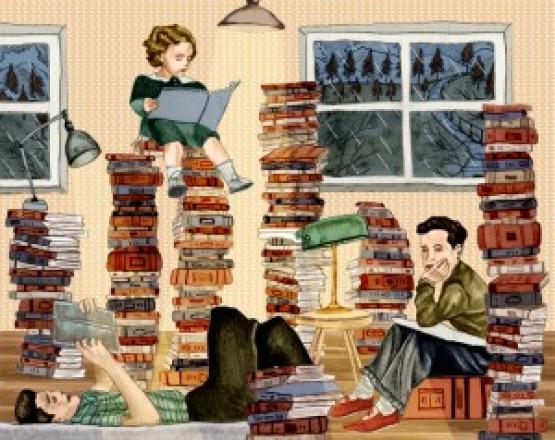Can Books Fly?

 As a kid, I had a recurring dream that now seems Daliesque. What I recall is images, grossly out of shape, out of proportion, and in odd relation to one another. There was always the truck, an eighteen-wheeler. One moment I was inside the dark, cavernous trailer, while the next moment I was outside the truck and it was small, like my own toy trucks. The only “human” image I recall in this dream was a thumb. (Freudians just shut up and go away.) And there were other images, things gleaned from childhood, a life of being small, a life of crawling and toddling on the floor, a life of looking up: a chair, a coffee table, curtains that extended from the floor to an incredibly high ceiling. But the most vivid image in this dream was the book. Periodically, it would fly overhead, spine skyward, pages flapping in the languid fashion of a bird with a substantial wing span. We are defined by questions, I suspect, and as a result of this dream a question that has been central to my existence all these years is Can books fly?
As a kid, I had a recurring dream that now seems Daliesque. What I recall is images, grossly out of shape, out of proportion, and in odd relation to one another. There was always the truck, an eighteen-wheeler. One moment I was inside the dark, cavernous trailer, while the next moment I was outside the truck and it was small, like my own toy trucks. The only “human” image I recall in this dream was a thumb. (Freudians just shut up and go away.) And there were other images, things gleaned from childhood, a life of being small, a life of crawling and toddling on the floor, a life of looking up: a chair, a coffee table, curtains that extended from the floor to an incredibly high ceiling. But the most vivid image in this dream was the book. Periodically, it would fly overhead, spine skyward, pages flapping in the languid fashion of a bird with a substantial wing span. We are defined by questions, I suspect, and as a result of this dream a question that has been central to my existence all these years is Can books fly?
Sometimes we say, when sales are brisk, books “fly off the shelf,” but with the demise of brick and mortar book stores, the simple, pleasurable act of entering a book store, perusing its shelves, not in search of a specific title necessarily, but just looking, has all but disappeared. Used to be that when visiting a new town or city, you’d keep your eye out for book stores. A good book store in an unfamiliar town was a haven of contemplative quiet which smelled of paper, the quality stuff in a new hardback, mingling with the brittle, yellowed pulpy stuff you’d find in used paperbacks with cracked spines. Very often the pleasure of being in a book store was not knowing what you were looking for, but hoping that, because you were in a book store, the exact right book would reveal itself to you and leap—or fly—off the shelf into your waiting hands. Call it a leap of faith.
When books aren’t being bought and sold, they’re often given away. (Or purloined, if you heeded Abbie Hoffman’s advice regarding his book entitled Steal This Book.) Books are loaned, lent, thrust into your hands by a fanatic with Rasputin eyes, proclaiming, “You must read this!” A few days ago I was on Plum Island, which is north of Boston, and I stopped at an establishment that had a sign in the window which read Beer Wine Help Wanted (no ordinary sign, this might be, for some, a philosophy, or a mantra). I discovered that though the establishment was closed someone had put a cardboard box outside the door with Free Books writ large on the side in black Marks-a-Lot. I sorted, I sifted: lots of Clive Cussler; several romance novels, which from the cover art might be classified as Bodice Ripper Lite. But then I found it—or them. Toward the bottom of the carton were two copies of The Great Gatsby. Both paperbacks in excellent condition; both sporting the famous original cover art featuring the sad yellow eyes (the pupils gimleting naked nubile women) peering out from the tear-stained deep blue field above what might be a carnival or city lights. Though over the years I have had several copies of Fitzgerald’s novel, I took one copy from the carton, because you can never have enough copies of Gatsby; you can never read it enough times. It’s a book from which one can’t help selecting sentences that resonate far beyond Gatsby and the world of East and West Egg:
“Conduct may be founded on hard rock or the wet marshes but after a certain point I don’t care what it’s founded on.”
“To a certain temperament the situation might have seemed intriguing—my own instinct was to telephone immediately for the police.”
“Something was making him nibble at the edge of stale ideas as if his sturdy physical egotism no longer nourished his peremptory heart.”
And though the novel’s concluding sentence is justifiably one of the most memorable in our literature, it is the first line that sets Nick Carraway’s narrative in motion with such grace and conviction:
“In my younger and more vulnerable years my father gave me some advice that I’ve been turning over in my mind ever since.”
Like the book I found in that carton, hi
s father’s advice, offered in the next paragraph, was free.
Books are often associated with freedom; a book that is given, whether it’s a
gift or is left in a box marked Free Books, is a unique expression of freedom. When they’re banned, when they’re burned, our sense of a just freedom is not only compromised but threatened. In recent years, there has been a tendency for people to place what are often called Little Free Libraries outside their homes. According to Conor Friedersdorf, who wrote about this phenomenon in The Atlantic, these “Give one, take one” Little Free Libraries began in Wisconsin in 2009, when a man established one outside his house in honor of his deceased mother, an avid reader, and the notion has since spread throughout the country. Some Little Free Libraries are compact architectural gems, sporting shingled roofs and handsome glass doors, which make it easier to peruse titles without exposing the books to inclement weather. Leaving books outside of one’s house is a matter of freedom of expression, yet there are people who, in the thrall of civic-minded idiocy, take exception to such exchanges. In many communities they have registered complaints with the local constabulary, citing building code violations and zoning laws. Friedersdorf continues that there’s a certain type of
American who is “determined to regulate every last aspect of community life. Due to selection bias, they are overrepresented among local politicians and bureaucrats. And so they have power, despite their small-mindedness, inflexibility, and lack of common sense so extreme that they've taken to cracking down on Little Free Libraries, of all things.”
Somewhere inside every avid reader resides an unremitting, unrepentant dreamer, one who knows that books can fly, one who knows that the fate of free books will not be determined by impassioned letters to the editor or incensed diatribes at community zoning board meetings. Such dreamers know that the solution is in the air. Rather than stacking volumes in a cardboard box or some weekender’s building project, we need only to stand in the front yard and hurl books skyward, allowing them to glide and wheel and circle overhead, always just within reach of innocent, unsuspecting passersby.
John Smolens short story “The End of the World” appeared in the North American Review (Winter 2013). His new novel Wolf’s Mouth will be published spring 2016.
Third and fourth illustration by: Gigi Rose Gray, an illustrator born and raised in New York City where she received her BFA in illustration from Parsons New School for Design. She now resides in sunny Los Angeles. Her works are inspired by the grace and elegance of women, mid-century design, french renaissance interiors, the colors olive green and mustard yellow, dreams, cypress trees, Greco-Roman art, and nostalgia.
Recommended
Nor’easter
Post-Op Appointment With My Father
Cedar Valley Youth Poet Laureate | Fall 2024 Workshop






